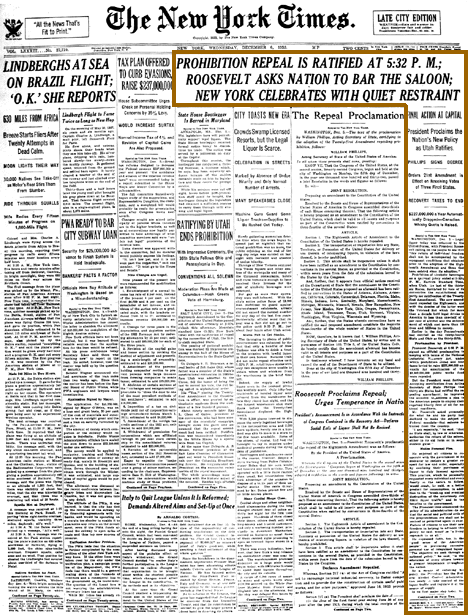The very next day, 5 December 1933, at 5:32 PM ET, the state of Utah voted for ratification, becoming the 36th State to do so, and thus achieving the 3/4 majority of states' votes needed to enact the amendment.
With that vote, the nearly 14 year ignoble reign of that 18th Amendment, otherwise known as Prohibition, was ended. The 21st Amendment, in effect, repealed the 18th Amendment. As of today, eighty years ago, it had become legal, once again, to manufacture, distribute, and sell alcoholic beverages.
21st Amendment to the Constitution of the United States of America
Section 1. The eighteenth article of amendment to the Constitution of the United States is hereby repealed.
Section 2. The transportation or importation into any State, Territory, or possession of the United States for delivery or use therein of intoxicating liquors, in violation of the laws thereof, is hereby prohibited.
Section 3. This article shall be inoperative unless it shall have been ratified as an amendment to the Constitution by conventions in the several States, as provided in the Constitution, within seven years from the date of the submission hereof to the States by the Congress.
Not so fast for the capital of the nation. In his book, "Prohibition in Washington, D.C.: How Dry We Weren't", historian Garrett Peck notes that Congress didn't rescind Prohibition in Washington, D.C. until 1 March 1934.
The 21st Amendment left to the states the right to control the importation, sale, and regulation of alcohol within each state's own borders. Washington D.C.'s repeal legislation, although tardy, would become a model for other jurisdictions in the U.S. on how to regulate, license, and control alcohol sales, as opposed to dispensing it directly. Despite that, to this day, there remains a seemingly inchoate patchwork of alcohol laws throughout the nation.
There's another unique facet of the 21st Amendment, noted by beer historian Bob Skilnik
American voters, through state referendums, added the 21st Amendment to the Constitution of the United States. It was the first time in our history that a constitutional amendment was passed, not simply by the will of legislators, but instead through popular mandate, i.e., the power of the U.S. citizenry [and the only time].
Take a moment today to honor the sagacity of those Americans of eighty years ago. Hoist a beer, sip a whisky, drink a glass of wine. Legally.
-----more-----
- I don't mean to single out South Carolina for opprobrium. North Carolina, for example, rejected holding a convention to consider the amendment, and eight other states took no action, yea or nay. [Wikipedia]
- See the New York Times 'late edition' story from 5 December 1933: here.
- Hadn't beer become 'legal' again on 7 April 1933? Yes, and no. It was only beer of 4% alcohol-by-volume (3.2% by weight) or less that had been okayed, accomplished through the legalistic legerdemain of President Franklin Roosevelt and Congress. Read more: here.
- How could Prohibition ever have occurred? Read "Last Call: The Rise and Fall of Prohibition", by Daniel Okrent. It's a fascinating history, and a sober (pardon the pun) reminder to remain vigilant.












No comments:
Post a Comment
Comment here ...